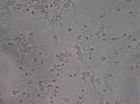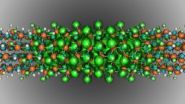(Press-News.org) Activated microglia-mediated inflammation promotes neuronal damage under cerebral hypoxic-ischemic conditions, so it is likely that inhibiting hypoxia-induced activation of microglia will alleviate neuronal damage. To test this hypothesis, Dr. Lining Ke and co-workers from Southern Medical University and Fujian Medical University in China co-cultured ginsenoside Rb1, an active component of ginseng, and cortical neurons. Their findings indicate that ginsenoside Rb1 attenuates damage to cerebral cortex neurons by downregulation of nitric oxide, superoxide, and tumor necrosis factor-α expression in hypoxia-activated microglia. This study, which has been published in the Neural Regeneration Research (Vol. 9, No. 3, 2014), suggest that ginsenoside Rb1 is a promising candidate for clinical use in the prevention of neuronal degeneration following cerebral ischemia.
INFORMATION:
Article: " Ginsenoside Rb1 attenuates activated microglia-induced neuronal damage," by Lining Ke1, Wei Guo2, Jianwen Xu2, Guodong Zhang1, Wei Wang2, Wenhua Huang1 (1 Department of Human Anatomy, Histology and Embryology, Southern Medical University, Guangzhou, Guangdong Province, China; 2 Department of Human Anatomy, Histology and Embryology, Fujian Medical University, Fuzhou, Fujian Province, China)
Ke LN, Guo W, Xu JW, Zhang GD, Wang W, Huang WH. Ginsenoside Rb1 attenuates activated microglia-induced neuronal damage. Neural Regen Res. 2014;9(3):252-259.
Contact: Meng Zhao
eic@nrren.org
86-138-049-98773
Neural Regeneration Research
http://www.nrronline.org/
Clinical value of ginsenoside Rb1 against neuronal damage following cerebral ischemia
2014-04-04
ELSE PRESS RELEASES FROM THIS DATE:
Depression increases heart failure risk by 40 percent
2014-04-04
Stavanger, Norway – 4 April 2014: Moderate to severe depression increases the risk of heart failure by 40%, a study of nearly 63 000 Norwegians has shown. The findings were presented for the first time today at EuroHeartCare 2014.
EuroHeartCare is the official annual meeting of the Council on Cardiovascular Nursing and Allied Professions (CCNAP) of the European Society of Cardiology (ESC). This year's meeting is organised jointly with the Norwegian Society of Cardiovascular Nurses and is held 4-5 April in Stavanger, Norway.
Ms Lise Tuset Gustad, first author of the ...
Tracking sperm whales' ecology through stomach contents
2014-04-04
AMHERST, Mass. – In the largest regional study of its type to date, marine ecologist Michelle Staudinger and colleagues offer better understanding of the feeding ecologies of two very rare sperm whale species in waters off the southeast U.S. coast, adding baseline data they say are important as climate change, fishing and pollution alters the animals' environment and food sources.
"Understanding what resources support populations of these incredibly rare animals is important to conservation," Staudinger, adjunct assistant professor in environmental conservation at the ...
To bridge LEDs' green gap, scientists think small... really small
2014-04-04
Nanostructures half the breadth of a DNA strand could improve the efficiency of light emitting diodes (LEDs), especially in the "green gap," a portion of the spectrum where LED efficiency plunges, simulations at the U.S. Department of Energy's National Energy Research Scientific Computing Center (NERSC) have shown.
Using NERSC's Cray XC30 supercomputer "Edison," University of Michigan researchers Dylan Bayerl and Emmanouil Kioupakis found that the semiconductor indium nitride (InN), which typically emits infrared light, will emit green light if reduced to 1 nanometer-wide ...
Disease-free survival estimates for ovarian cancer improve over time
2014-04-04
SAN DIEGO, April 4, 2014 – The probability of staying disease-free improves dramatically for ovarian cancer patients who already have been disease-free for a period of time, and time elapsed since remission should be taken into account when making follow-up care decisions, according to a study led by researchers at the University of Pittsburgh Cancer Institute (UPCI), a partner with UPMC CancerCenter. The findings will be presented Wednesday at the American Association for Cancer Research (AACR) Annual Meeting 2014.
A patient's prognosis traditionally is determined when ...
A new species of horseshoe worm discovered in Japan after a 62 year gap
2014-04-04
The horseshoe worm is a worm-like marine invertebrate inhabiting both hard and soft substrates such as rock, bivalve shells, and sandy bottom. The name "horseshoe" refers to the U-shaped crown of tentacles which is called "lophophore." Horseshoe worms comprise a small phylum Phoronida, which contains only ten species decorating the bottom of the oceans.
The new species Phoronis emigi, the eleventh member of the group described in the open access journal ZooKeys, comes after a long 62 year gap of new discoveries in the phylum. It is unique in the number and arrangement ...
Recurrent head and neck tumors have gene mutations that could be vulnerable to cancer drug
2014-04-04
SAN DIEGO, April 4, 2014 – An examination of the genetic landscape of head and neck cancers indicates that while metastatic and primary tumor cells share similar mutations, recurrent disease is associated with gene alterations that could be exquisitely sensitive to an existing cancer drug. Researchers from the University of Pittsburgh Cancer Institute (UPCI) and Yale University School of Medicine will share their findings during a mini-symposium Sunday at the American Association for Cancer Research Annual Meeting 2014.
About 50 percent of patients diagnosed with head ...
Common breast cancer subtype may benefit from personalized treatment approach
2014-04-04
SAN DIEGO, April 4, 2014 – The second-most common type of breast cancer is a very different disease than the most common and appears to be a good candidate for a personalized approach to treatment, according to a multidisciplinary team led by scientists at the University of Pittsburgh Cancer Institute (UPCI), a partner with UPMC CancerCenter.
Invasive lobular carcinoma, characterized by a unique growth pattern in breast tissue that fails to form a lump, has distinct genetic markers which indicate drug therapies may provide benefits beyond those typically prescribed for ...
Plant-derived anti-cancer compounds explained at national conference
2014-04-04
SAN DIEGO, April 4, 2014 – Compounds derived from plant-based sources — including garlic, broccoli and medicine plants — confer protective effects against breast cancer, explain researchers at the University of Pittsburgh Cancer Institute (UPCI), partner with the UPMC CancerCenter.
In multiple presentations Sunday at the American Association for Cancer Research (AACR) Annual Meeting 2014, UPCI scientists will update the cancer research community on their National Cancer Institute (NCI)-funded findings, including new discoveries about the mechanisms by which the plant-derived ...
Genetic testing beneficial in melanoma treatment
2014-04-04
SAN DIEGO, April 4, 2014 – Genetic screening of cancer can help doctors customize treatments so that patients with melanoma have the best chance of beating it, according to the results of a clinical trial by researchers at the University of Pittsburgh Cancer Institute (UPCI), a partner with UPMC CancerCenter.
The trial, funded by the National Institutes of Health (NIH), will be presented Monday at the American Association for Cancer Research (AACR) Annual Meeting 2014. It showed that the cancer immune therapy drug ipilimumab appears most likely to prevent recurrence ...
Combining cell replication blocker with common cancer drug kills resistant tumor cells
2014-04-04
SAN DIEGO, April 4, 2014 – Researchers from the University of Pittsburgh Cancer Institute (UPCI), a partner with UPMC CancerCenter, have found that an agent that inhibits mitochondrial division can overcome tumor cell resistance to a commonly used cancer drug, and that the combination of the two induces rapid and synergistic cell death. Separately, neither had an effect. These findings will be presented Monday at the annual meeting of the American Association for Cancer Research Annual Meeting 2014.
"In our earlier work, we found that blocking production of a protein called ...


